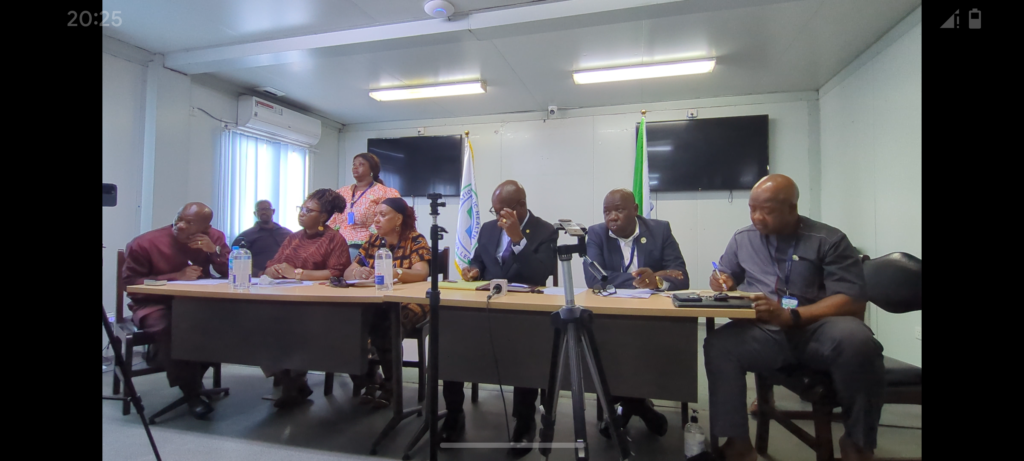By Kemo Cham
The National Public Health Agency (NPAH) has re-introduced Ebola-era public health safety measures geared towards curbing the spread of Mpox in the country.
Owners and managers of all public spaces and institutions are now required to provide hand washing stations at all entry and exit points, regularly clean surfaces that are frequently touched by the people and display Mpox prevention posters as part of efforts to educate the public about the dangers of the disease, the agency said on Tuesday.
People in charge of these public spaces and institutions are also required to watch out for signs and symptoms of Mpox and report them to authorities, says Prof. Foday Sahr, Executive Director of the NPHA. He added that institutions are also required to appoint health focal persons in every location, quarantine exposed persons for 21-days, and keep their facilities in good sanitary conditions at all time.
“This is applicable to all public spaces, work spaces, schools and places of worship,” Prof. Sahr said at a press briefing at the Emergency Operation Center (EOC) of the Ministry of Health at Cockerill in Freetown.
He explained that the areas that are subject to this requirement include markets, shops, transport hubs, event venues, community centers, schools, universities, government and private offices and correctional centers.
All these institutions and public places are required to avoid overcrowding and always keep a distance of at least one meter (3 fee) between people, he said.
“Failure to follow these rules may lead to fines, closure of premises and prosecution under the public health Act 2022,” the NPHA boss warned, stressing that authorised health officers may inspect and take action as needed.
The new set of regulations which take effect immediately are in response to the escalating cases of the viral disease.
Data provided by the agency indicate that as of May 6th, Sierra Leone has registered 1,481 cumulative confirmed cases. Majority of the cases were recorded between March and April, during the second wave of the epidemic.
On Tuesday alone, 94 new confirmed cases were recorded as part of the third wave.
All of 16 districts of the country are now actively transmitting the virus, the data shows. And the Western Area Rural and Urban still remain the epicentre, accounting for about 95 percent of the cases.
The NPHA also says that it has line listed over 2, 100 contacts, 896 of whom have completed the 21- day quarantine procedure.
Mpox, previously known as monkeypox, was first discovered as a zoonotic disease that causes fevers, headaches and boils. The virus also spreads from person to person, through close physical contacts.
The current outbreak started in 2023 and has affected 22 African countries, according to the Africa Centers for Disease Control and Prevention (Africa CDC).

Sierra Leone recorded its first case on January 10, 2025. Three months later, the cases have increased exponentially, raising concern among health authorities.
Also of major concern to the authorities is the severity of the symptoms.
Like the rest of the West African region, Sierra Leone is dealing with the Clad 2 strain of the virus, which is considered less severe, compared to Clad 1. But officials say patients have been presenting with unprecedented level severity of genital lesions, among others.
The NPHA data shows that there is high prevalence of cases among school children and members of the security forces.
As of May 5, 2025, 10 deaths have been recorded. All of the victims are said to be immunocompromised.
The NPHA and the Ministry of Health recently played host to a joint team of experts from the World Health Organization (WHO) and the Africa CDC, which evaluated the country’s response. Prof. Sahr said some gaps were identified in the country’s response strategy, which has necessitated a shift going forward.
In this vein, effective immediately, all positive cases will now be managed in health facilities, he declared. Before now, patients were allowed to go home while under treatment.
“We noticed that when you tell people to treat the sickness at home, within two weeks they return with two or three other people. So the virus is spreading in the community,” says Minister of Health Dr Austin Demby. “We are at a point where we have to shift our strategy.”
To meet the demand for space, the government says it is activating treatment centers in three main locations: at Hastings, where it will have 400 beds; at Calaba Town with 100 beds, and the Port Loko Field Hospital.
The ongoing ‘Operation Find Them All’ will also be extended to all districts outside Western Area. In addition, all suspected cases will henceforth be tested.
The ongoing national vaccination drive will also be intensified, targeting people must at risk, including healthcare workers, immunocompromised patients and contacts of infected persons.
So far 2,567 people have received their shots, out of the over 50, 000 doses the government received from GAVI.
Dr Demby said the government is lobbying for more vaccines to be brought into the country.
But in the meantime, he noted, the available stock needs to be utilized effectively with the goal of cutting the chain of transmission of the virus.
“The vaccine isn’t enough. We have to use it wisely,” he said.























